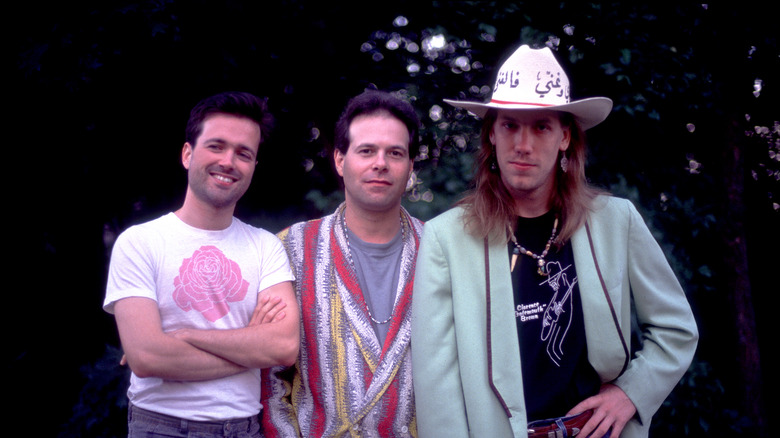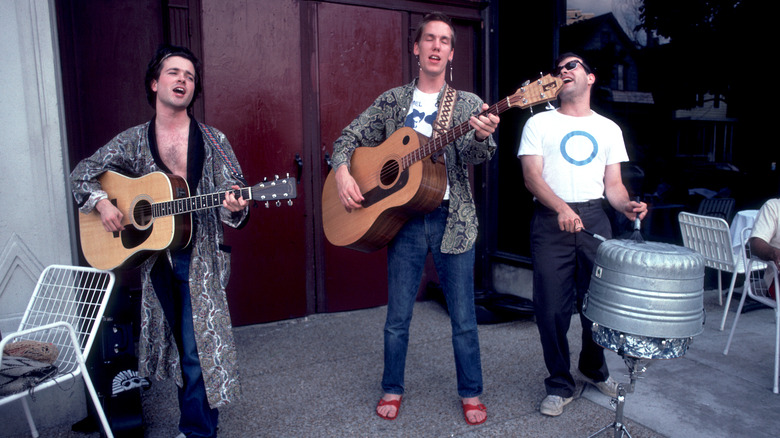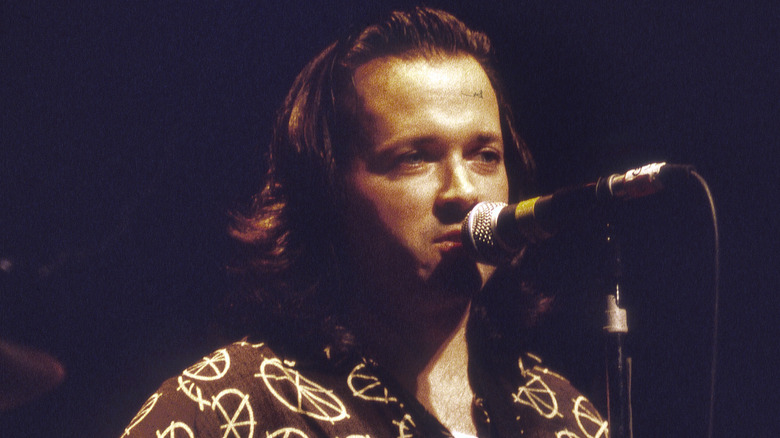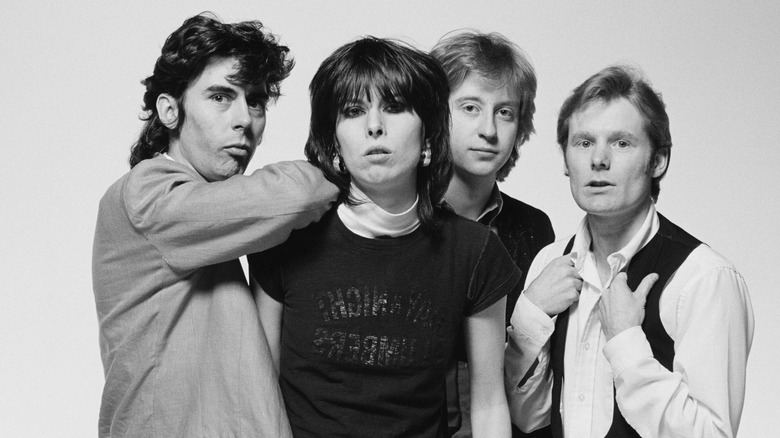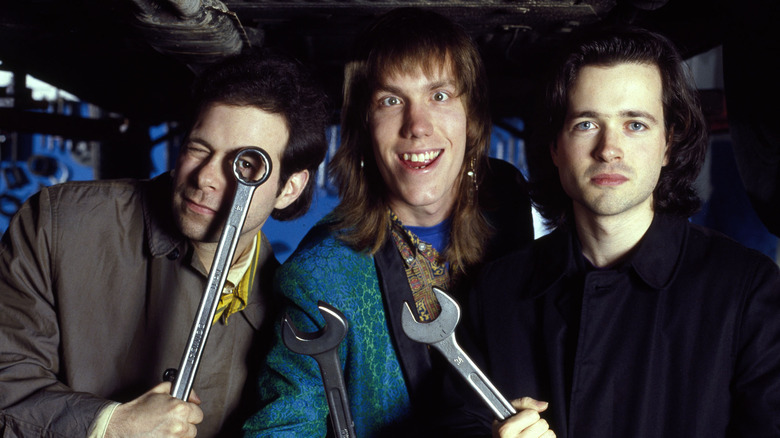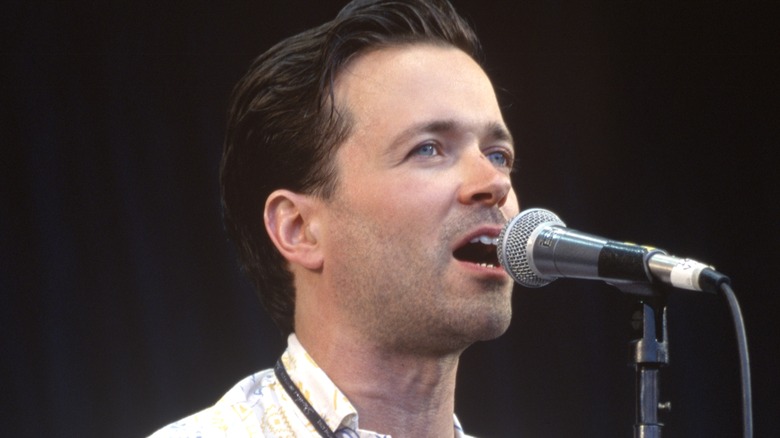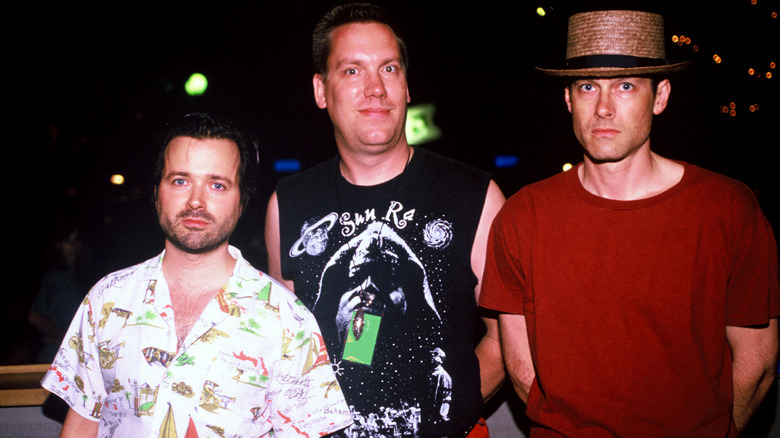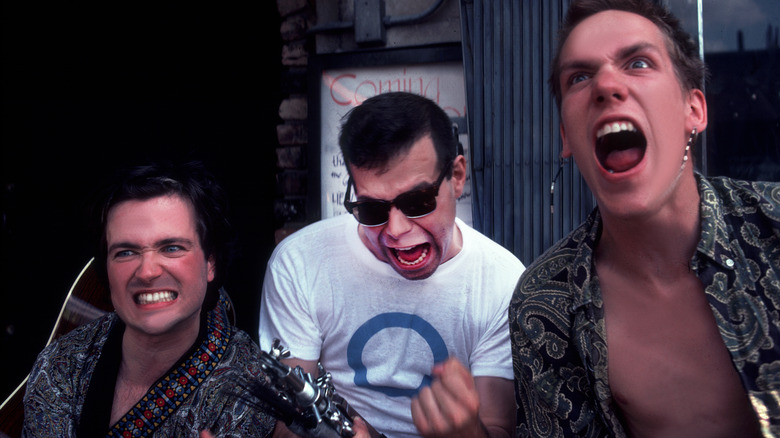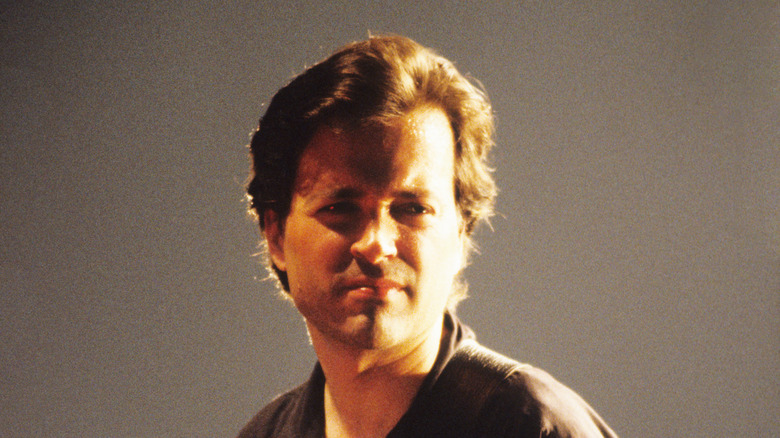The Untold Truth Of The Violent Femmes
Alternative rock started to take hold in the early 1980s, with many of those bands taking cues from punk, hooky New Wave, and folk. The Violent Femmes combined all three into one raw, gritty, humorous package. The stripped-down Milwaukee trio is a punk band, all snotty vocals about youthful frustrations and played both aggressively and melodically. But it's also a folk band, because its instruments are acoustic and minimal. The Violent Femmes rode its unique sound into status as one of alternative rock's pioneers and cult favorites. They're best known for catchy, enduring singles like "Gone Daddy Gone," "Kiss Off," and "Blister in the Sun," showcasing the wry and dryly funny lyrics of frontman Gordon Gano with the freewheeling bass work of Brian Ritchie.
For more than 40 years, the Violent Femmes have been strutting their stuff to bring their American music to the masses. We decided to add it up and found that it doesn't have something to do with luck, and put it all down on their permanent record. Here's everything, everything, everything, everything there is to know about the Violent Femmes.
The very real Violent Femmes was named after a fake band
Before the Violent Femmes, as fronted by Gordon Gano, existed, founding bassist Brian Ritchie was part of a bare-bones duo called Ruthless Acoustics. Violent Femmes drummer Victor DeLorenzo had previously been in the group, and then replaced by Jerry Fortier. Wanting to sound cool to Fortier, Ritchie made up stories about his brother, so as to seem hip by association. Fortier wanted details. "At the time my brother was working for an insurance company, totally straight," Ritchie recalled to Rockzone. "So of course I lied and said, 'He's exactly like me, he's a punk and has his own band!'" When Fortier asked Ritchie to identify his brother's band, the bassist froze. "I had to come up with something, so I blurted out, 'Uh ... Violent Femmes.'"
That same day, Fortier went over to the home of DeLorenzo, with whom he was in the early stages of forming another band. DeLorenzo thought the story and the name were funny, so they adopted "Violent Femmes" for use in their new project.
An early gig ended in chaos
One of the first times that eventual Violent Femmes Gordon Gano and Brian Ritchie would play together was at the former's high school in Milwaukee. Gano was set to be awarded by his school's chapter of the National Honor Society, and the ceremony included a talent show. He decided to sing and play guitar on an original song, "Gimme the Car."
The song would eventually appear on the Violent Femmes' first album in 1983, and it's told from the point of view of a sexually frustrated teenage boy detailing how he planned to take a girl out on a date, get her drunk, and take advantage of her when her inhibitions are lowered. Gano saw Ritchie at a punk show the night before the ceremony and enlisted him to be his accompanist. The song did not please the crowd of faculty members.
"The place just erupted into mayhem, the principal and some of the teachers are standing on the side of the stage waving their arms yelling stop, but they couldn't stop us because the amps miraculously were plugged into the front of the stage, so if they wanted to unplug us, they'd have to actually walk in front of us and unplug the amps, which none of them had the guts to do," Ritchie told The Philadelphia Inquirer. Gano was punished — he received a suspension, and his National Honor Society prize was revoked.
The Pretenders discovered the Violent Femmes
One of the biggest breakout successes of the New Wave era was the Pretenders. Fronted by Chrissie Hynde, the band scored numerous hits in the late 1970s and early 1980s, including "Brass in Pocket" and "Back on the Chain Gang." In August 1981, the Pretenders' tour took them to Milwaukee for a concert in that city's Oriental Theatre. That same day, the Violent Femmes had attempted to audition for a gig at Milwaukee's Century Hall, but management refused to listen to the band.
Upset over the slight, the group decided to busk by the Oriental Theatre. "We just set up in front there and started playing, as we usually would do," bassist Brian Ritchie told Salon. Fans filing in for the Pretenders show liked what they heard, and so did Pretenders guitarist James Honeyman-Scott. He and Hynde invited the Violent Femmes into the Oriental Theatre for a short, impromptu opening act set.
That appearance didn't immediately lead to a record deal, but it got the band more attention and more prominent gigs. Shortly after the Pretenders pulled the Violent Femmes on stage, the group was asked to open for punk icon Richard Hell at CBGB's in New York City. "Robert Palmer from the New York Times wrote a review and only mentioned a paragraph about Richard and the rest was about us," Ritchie told Spin. "We didn't even have a record out yet."
The first two Violent Femmes albums are intertwined
Some of the Violent Femmes' 1983 self-titled debut was written by frontman Gordon Gano when he was 15, each song a weekend project. "I thought, 'If I write a song that I think is really great, then I've really done something,'" he told Life of the Record. By the time the Violent Femmes had signed with Slash Records and had a full-length album in the works, 18-year-old Gano had two albums' worth of material banked, and the band separated Gano's tunes into two groups. "We decided to put the poppy songs on the first album. We didn't know that we'd be making more than one album so we thought it was a good statement," bassist Brian Ritchie said. The fresh leftovers become the second Violent Femmes album, released in 1984. "We could have released 'Hallowed Ground' first," Ritchie explained.
But the band and its label unleashed "Violent Femmes" first, and its creation wasn't overthought. "There was zero rehearsal," Ritchie told The Philadelphia Inquirer. "There are a few different good ways to make a record, and one of them is to not rehearse and just get the most honest and spontaneous reaction to the material, and put it down as fast as possible."
The Violent Femmes dabbled in Christian music
While the majority of the Violent Femmes' self-titled 1983 debut and the 1984 follow-up "Hallowed Ground" were written by Gordon Gano around the same time, the LPs are very different. The first consists primarily of agitated pop-rockers like "Kiss Off" and "Blister in the Sun," while the second bears traces of classic religious music and gospel elements, particularly in "Jesus Walking on the Water" and "Country Death Song." That wasn't done out of humor or irony: Gano was raised in the Baptist church by a minister father, and remained a Christian well into adulthood and throughout his time with the Violent Femmes.
Part of the reason why the more outwardly religious songs were saved for "Hallowed Ground" was because Violent Femmes bassist Brian Ritchie didn't want to make Christian music. "At the time, Brian was very aggressively anti-anything Christian," Gano told the Phoenix New TImes. "He said he didn't want to be playing in a band that was expressing something that he felt so vehemently against." Ritchie eventually relented in time for "Hallowed Ground," just because he liked Gano's songs so much.
Gano would lace spiritual themes throughout later Violent Femmes releases, to mixed results from fans. "Some people say, 'I can't listen to Christian music, but I can listen to your songs.' But other people don't like it," he told CNN.
A 1980s breakup didn't stick
By the mid-1980s, the Violent Femmes had found such success that it unnerved the band. Touring behind its third album, 1986's "The Blind Leading the Naked," the trio played the historic Carnegie Hall and worked the audience into such a frenzy that some fans stormed the stage and attempted to take the musicians' instruments. That prompted venue management to abruptly end the show, and the Violent Femmes, who'd experienced similar unsettling incidents on the tour, to call for a hiatus.
With the band essentially broken up for an indeterminate period of time, the musicians released solo projects much different than their work in the Violent Femmes. Bassist Brian Richie recorded the experimental rock record "The Blend" for punk label SST, where he got to show off his lead guitar skills. Lead singer Gordon Gano and his partner, vocalist Zena Von Heppinstall, formed a gospel-punk hybrid band called Mercy Seat.
The creation and dissolution of Mercy Seat was what ultimately led to the split — and subsequent reformation — of the Violent Femmes. "Gordon's girlfriend wanted him to quit the Femmes and form a band with her," Ritchie told Three Monkeys Online. "When that failed Gordon opted to come back to the Femmes." In 1989, the second iteration of the Violent Femmes released its fourth album, "3."
The Violent Femmes was unplugged before Unplugged
In its early years, the Violent Femmes rarely used electric instruments; Gordon Gano preferred an acoustic guitar, and Brian Ritchie often played a stand-up bass. Performing punk music on folky instruments made the Violent Femmes a popular outlier in the electric guitar-driven world of alternative rock in the 1980s, and also something of a precursor to "MTV Unplugged." The live concert series, a staple of the cable music channel's programming throughout the 1990s, presented well-known icons of rock playing their loud and electrified tunes on acoustic instruments in an intimate setting, allowing their songs to breathe without the masking of feedback or production tricks.
According to a music world rumor in the 1990s, the Violent Femmes created the concept of "MTV Unplugged," with luminaries like Eric Clapton, Pearl Jam, and Nirvana following its lead in putting away the electric guitars. It's only sort of true. "We didn't have the idea. Somebody from MTV told us that they were inspired by us to ask other bands to play acoustically like we do," Ritchie told Spin. "Then suddenly you saw a lot of that happening, but it had nothing to do with us. It was just a matter of them wanting to be like us." In spite of laying the groundwork and providing the nugget of the idea, the Violent Femmes was never asked to perform on "MTV Unplugged."
They like 'American Music'
In 1991, "American Music" reached NJo. 2 on Billboard's alternative rock chart, making it the most commercially successful single ever for the Violent Femmes. Gordon Gano populated the song with dozens of lyrical couplets that sound familiar, but are largely nonsensical when strung together — sections about being born too late, lamenting the lack of a prom date, and having done too many drugs, for example. Taken altogether, "American Music" is an elaborate pastiche of subtle homages to American music — it's a '60s-style pop song about pop music written and produced to sound like a slick, '60s-style pop song.
In its first form, "American Music" was a typical Violent Femmes loud-acoustic number inspired by the Ramones, a punk band with a sound alluding to that of '60s girl groups. "But [drummer] Victor [DeLorenzo] thought that Ramones approach wasn't right for the song and said, 'Why don't we do it as a shuffle?'" bassist Brian Ritchie told Radio Milwaukee. Then the band got to work. "There is a lot of arranging on that song. We put many, many pop music and rock references into the melody of that song," Ritchie said. There are some Beach Boys motifs, and the use of sleigh bells was taken from the production work of Phil Spector. The rapid tempo escalation at the song's end is a nod to "Heroin" by the Velvet Underground.
How 'Blister in the Sun' was lost and twice remade
Leading off its first album, "Blister in the Sun" is the Violent Femmes' best-known song, a tune that entered the public consciousness slowly but surely as much as the LP that spawned it — it took eight years for that record to sell a million copies. Firmly entrenched and accepted as a definitive 1980s song, makers of the 1997 film "Grosse Pointe Blank" — about a hired killer reflecting on the '80s at his high school reunion with his ex-girlfriend, a classic alternative rock DJ — wanted "Blister in the Sun" for the soundtrack. Two versions of the song bookend the accompanying album.
"Grosse Pointe Blank" star and co-writer John Cusack helped choose the film's music, and he asked the Violent Femmes to record a new version of "Blister in the Sun." So, the band created the deconstructed, slowed-down "Blister 2000." "And then they decided they liked the original one just as much, so in the end they decided to include both," Violent Femmes bassist Brian Ritchie told Billboard. However, the Violent Femmes would also have to re-record, to the best of its abilities, the 1983 version of "Blister in the Sun." The master had been left behind in the studio where the band recorded the song, and when the facility shut down, the tape was thrown away.
The Violent Femmes released one of the first-ever digital albums
The Violent Femmes released "Something's Wrong" in 2001. An obscurities compilation, it consisted entirely of rarities from the band's 20-year history, including demos, live recordings, alternate takes of album cuts, and covers of songs by Bob Dylan, Paul Anka, and the Police. This collection of musical historical artifacts was itself a historical object: At a time when digital music was still new-fangled, "Something's Wrong" was made available to the public in a purely digital format. Originally released as an MP3 collection on the subscription-based download site EMusic.com, "Something's Wrong" was never re-released on CD or vinyl, and has never been made available on digital music platforms like Apple Music or Spotify.
A major act putting out a digital-only LP in 2001 was exceedingly rare. David Bowie sold a download-only album in 1999, and after the Violent Femmes' "Something's Wrong" took a future-looking step, Apple's iTunes Music Store wouldn't open for another two years.
Wendy's chili helped break up the Violent Femmes
Fast food chain Wendy's launched an advertising campaign in 2007 touting its chili and baked potatoes. Soundtracking the commercial: the Violent Femmes' "Blister in the Sun." Fans discussed the commercial online, finding the use of the Milwaukee band's best-known song in such a way to be distasteful. Violent Femmes bassist Brian Ritchie explained how it all happened at OnMilwaukee. "Gordon Gano is the publisher of the song and Warners is the record company. When they agree to use it there's nothing the rest of the band can do about it, because we don't own the song or the recording," he wrote. "Therefore when you see dubious, or in this case disgusting, uses of our music, you can thank the greed, insensitivity, and poor taste of Gordon Gano."
While Ritchie couldn't prevent his bandmate from using Violent Femmes in ads, he tried to financially benefit from it. In August 2007, Ritchie sued Gano, alleging that he'd been cheated out of royalties and authority over some Violent Femmes songs, because he'd never been properly credited as a songwriter. The suit also suggested that the Wendy's commercial damaged the band's credibility.
Ritchie and Gano reached an out-of-court settlement in 2012 and reformed the Violent Femmes, which hadn't played live since just before the lawsuit. However, original drummer Victor DeLorenzo declined to rejoin his bandmates, over what he considered disagreeable terms of a new Violent Femmes business arrangement.
The Violent Femmes traded covers
Pop-R&B supergroup Gnarls Barkley, consisting of DJ Danger Mouse and rapper-singer CeeLo Green, followed up its 2006 smash hit "Crazy" with another track from its album "St. Elsewhere" — "Gone Daddy Gone." A No. 26 hit on Billboard's alternative rock chart, it proved more commercially successful as a cover than in its original version; an album track on the Violent Femmes' independently released 1983 self-titled debut album. "I heard it on the way to the studio one day, and I thought it could be transformed into something else," Danger Mouse told New York Magazine of his reasons for covering the tune. "I always liked the way rock bands in the '60s, especially on their first few records, would shamelessly cover the stuff they were listening to at the time."
As if to say thanks to Gnarls Barkley for amplifying its 23-year-old song and generating songwriting royalties for Gordon Gano, the Violent Femmes repaid the favor, in the spirit of Danger Mouse's motivations. In 2008, the band recorded its own take on "Crazy," releasing it as a standalone single on iTunes and vinyl.
